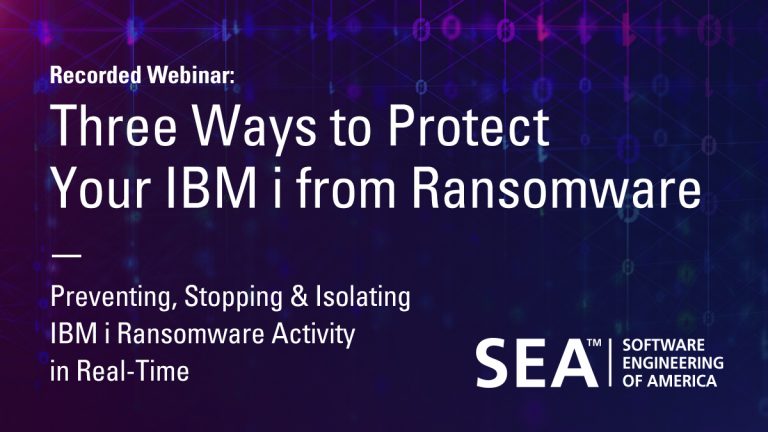
At SEA, It always amazes us how many IT managers devote time and money to fighting viruses on their PCs and network servers, but don’t use anti-virus and anti-ransomware software to protect their own IBM i Integrated File System (IFS) folders. This is in spite of the fact that IFS folders are used for many critical functions that may be exposed to viruses and ransomware, including:
- Windows PC users that map network drives to IBM i shared folders and read and write data to those drives
- IBM i Web servers that are exposed to the Internet and use IFS folders for executables, graphics, and data storage
- Third-party IBM i software that uses IFS folders for stream file storage and processing
Any of these IFS folders can be infected by viruses and ransomware.
Still not convinced that IBM i shops need their own anti-virus and anti-ransomware solution? Here are four surprising facts about IBM i Anti-Virus/Anti-Ransomware protection that you may not have previously realized.
- The IFS can be an infection source for Windows desktops – While a virus stored in the IFS can’t infect the IBM i operating system, it can be a carrier for Windows PCs that map network drives to the IFS. IFS-stored viruses can easily spread to Windows desktops. Shops that use the IFS for Windows file serving will share their virus storage problems with Windows file servers.
Similarly, after a ransomware attack, ransomware can be stored in the IFS where it can downloaded and activated at a later point, re-infecting PCs and the IFS.
- The IFS is susceptible to ransomware – IFS stream file folders are no different than Windows server folders. A Windows desktop that uses IBM i NetServer to map a drive to an IFS folder can and will encrypt and rename files in that folder, whenever a ransomware attack happens. Once your valuable stream file data is renamed and encrypted, the ransomware makers will also post ransom notes to your IFS folders demanding payment to regain access to your files.
- IFS Anti–Virus scanning and Anti-Ransomware protection is becoming a requirement for regulatory compliance –If your organization needs to comply with Payment Card Industry Data Security Standard (PCI DSS), Health Insurance Portability and Accountability (HIPAA), or Sarbanes-Oxley (SOX) standards, anti-virus software is a key requirement in maintaining compliance. SOX compliance for example, requires that companies “…Ensure system security with malicious software protection, detection, and correction.” Similar requirements hold true for HIPAA and PCI. Auditors know this and expect compliance.
- Viruses and ransomware can disrupt third-party software – A single infected PC can infect, encrypt, delete, corrupt, or rename IFS files. Many third-party IBM i software packages (including faxing, email, document distribution, and credit card processing software) use IFS folders for stream file storage and processing. These folders can be exposed to and affected by virus- and ransomware-infected Windows machines, and those infections can crash IBM i applications. As more vendors adopt code bases that run on multiple operating systems (including Windows, Linux, Unix, and IBM i), IBM i third-party applications become vulnerable to the same threats as applications running under Windows and other operating systems.
If your IFS is exposed to desktop users or the Internet, you should look at IBM i anti-malware and anti-ransomware scanning solutions, such as iSecurity Anti-Virus and iSecurity Anti-Ransomware. These programs are just as valuable for your IBM i IFS as they are for your Windows desktops and servers.





